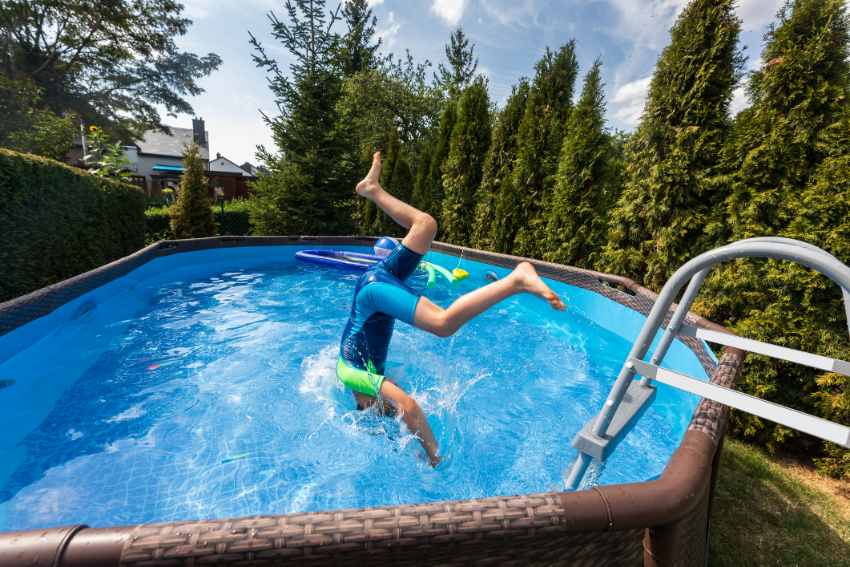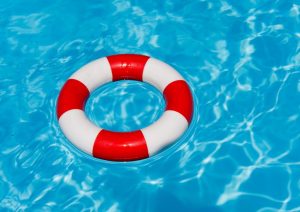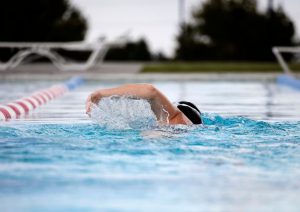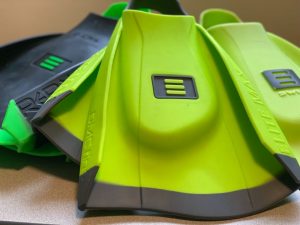
7 Best Swim Snorkels for Better Technique and Faster Swimming
Ready to throw down on a new swimmer’s snorkel? Here are reviews of the best swim snorkels for lap swimming.

Wondering how to get started with cleaning an above-ground pool? Here’s a step-by-step guide to crystal-clear pool water in your above-ground swim pool.
Your backyard pool is ground zero for summertime fun.
Cooling off on hot, sunny days, drinks in hand, are kind of the best.
But you know what’s not the best?
The cleaning and maintenance that comes with being an above-ground pool owner.
As tedious as it can be, cleaning an above-ground pool is actually pretty simple when you’ve got a simple checklist in place.
In this guide, we’ll take you step-by-step to cleaning an above ground pool like a total boss.
Next stop, cool, crystal-clear pool water!
Nothing quite gets a summer day off worse than peeling back the cover on your above ground pool and seeing dirty, murky water.
A cloudy pool can be frustrating, but getting to the root of the cause is a handy way to avoid it getting cloudy again down the road.
Here are the most common causes of a dirty above-ground pool:
A lot of people like to place their pools under trees, for added shade. Keeping cool works better when you can shade yourself from the sun, after all.
While this isn’t exactly a bad idea, it can make it more susceptible to cloudiness.
Leaves and twigs fall, bugs, bird droppings, along with the potential of other critter droppings and organic matter can find its way into the water.
Even if your pool isn’t near a tree, it can still attract dirt and debris.
If you live in an area that’s windy and/or dry, it can blow dust around and into the water. It doesn’t take much dirt or runoff water from a storm to contaminate a pool and make it look murky.
You can avoid most dirt and debris by routinely covering your pool overnight (which will also save you money on pool heating costs) and when it’s not in use.
Another common cause of cloudy pools is a filter that isn’t being run long enough (or broken altogether!).
If this is your first above-ground pool, you may not know what to expect from a pump and filtration system. The pump should be running long enough to filter the full volume of the pool water over at least once a day.
Alternatively, you may simply need to clean your filter.
If you notice your filter isn’t pushing water through as it normally does, there may be some kind of clog or obstruction going on.
Routinely emptying and cleaning your pool filter will help save you a ton of time cleaning your above-ground pool over the course of the summer season.
For most new pool owners, the most confusing aspect of cleaning and maintaining the water is balancing the pool chemicals.
Use the wrong type or amount of chemicals, and you could be doing more harm than good.
While pH itself may not cause cloudy water, it does make a huge difference in how chlorine and other crucial chemicals react in the pool water.
For example, a notably high pH can keep calcium from dissolving correctly, which can actually cause foggy water.
See also: How to Drain an Above Ground Pool
On the other end of the spectrum, if pH is too low, chlorine becomes particularly reactive, depleting quickly.
This leads to forming combined chlorine (the “smelly” chlorine), also causing cloudy water.
Moreover, it can prevent the chlorine from effectively eliminating bacteria, and algae, among other microorganisms we don’t want in the pool.
This is usually an issue found more in larger above-ground pools and pools that have lots of fixtures and loose pool lining.
Poor water circulation can end up with algae growth, which you may find in the “dead spots” of the pool.
Dead spots are where there’s little-to-no circulation of water, which tend to be located behind pool ladders, by steps, under the skimmer, in cracks, nooks, crannies, and liner folds.
You may be thinking, “but I have a pump that’s supposed to fix that for me!”.
And you’d be right, a pump is designed to circulate your pool water.
However, it’s harder to get that water moving in the spots we just mentioned.
Alrighty, let’s get our Mr. Clean on and get this pool cleaned and ready for action.
First, it’s important to determine if your pool uses a filtration system or not as that will decide our course of action.
For pool owners without a filtration system, you probably have an inflatable pool or one that isn’t supposed to be filled for long periods of time.
In this case, when the water is dirty or contaminated in some way, you simply drain it and refill it.
For smaller above-ground pools, this is ideal, as they need the water to be switched out after just a few uses.
However, after they’re drained, you should scrub and clean the inside to eliminate the growth of algae while getting rid of dirt and grime.
Follow these step-by-step instructions for best results:
Pool owners that have a filter and pump will have a few more steps.
Using your pool skimmer or net, collect larger debris that has fallen into the water (leaves, debris, etc).
One of the problems unique to above ground pools is that they don’t have a drain system that makes cleaning debris a more manual task.
Your filter pump will circulate all pool water through the filter to eliminate debris and other grime.
However, you should ensure the filter pump runs for at least 8 hours a day for best results so that it has a chance to filter ALL the water in the pool.
You can automate this task by using a pool pump timer so that it turns off and on on its own, based on your preferred schedule.
When dirt and debris gets caught in the filter, it can leave the pool cloudy.
If your pressure gauge is 8-10 pounds above the norm, try backwashing your pool.
If you’re not sure what the “normal” pressure is, check out the filter manufacturer’s guide.
(You can also reference this more detailed guide about how to backwash a pool sand filter.)
If you’re using a cartridge filter it needs cleaning every now-and-then.
To do so, turn off the filter, take out the cartridge, and spray it down with a garden hose when you see the pressure meter reading 5-10 pounds above normal.
Easey-peasey!
This should be done on a weekly basis or more, depending on where your pool is located and how much tree overhang and organic debris is landing in the water.
You’ll be surprised how much stuff lands in the pool that isn’t as obvious, from dead insects to leaves to dirt from the feet of pool users.
The pump basket is where all the dirt and debris collects, so make sure to take out the basket and empty the contents.
If needed, spray it out with a garden hose to get rid of any remnants.
This should also be done regularly, depending on how quickly the pool water becomes contaminated.
Ideally, this should be done every day so it never becomes clogged up.
Alright, now that we’ve filtered the pool water, cleaned the filter, removed any foreign visitors, and emptied the pump/skimmer baskets, it’s time to put some sweat equity into the pool by giving it a good brush.
Attach a pool brush to a telescopic pole, making sure it can reach all wall surfaces and hit all the corners, behind the pool ladder, and so on.
Opt for a brush with nylon bristles that won’t tear up your pool liner.
Depending on the amount of grime and angle, you may choose to use a handheld brush as well.
Always brush in a downward motion to loosen up any algae and dirt.
Okay, we’re almost there!
The final cleaning task is vacuuming the pool.
I like to do this last, after all the scrubbing and basket-clearing, as you get a chance to sweep up the last remnants of any dirt, organic matter, or other uninvited party guests.
A basic pool vacuum hooks up the pump and filter system, sucking up and filtering the water.
(You can reference this article on how to vacuum an above ground pool for more information on this specific task.)
Once done, it’s time to put our lab coat on and get down with some chemistry.
Awesome—we’ve basically gotten to the end of our little process!
Now it’s time to pull out our trusty pool testing kit and see where things are at with pool chemistry.
Ideally, the water should have:
Treat as necessary to achieve those ranges, and you are basically back in business.
And as always, run the pool pump and filter so that water is properly circulating and being cleaned.
Pool vacuums are perfect for this!
There are two kinds: the handheld pool vacuums that have a long telescoping pole and the automatic, robotic pool vacuums that work on auto-pilot.
Both connect to the pool filter system to get after all that dirt, debris, and algae that is forming on the bottom and even the sides of your pool.
Automatic pool vacuums obviously have the added benefit of doing most of the hard work on its own.
You’ll need chlorine (either liquid chlorine or chlorine tablets), a good pool shock, water balancers, algaecides, and cyanuric acid.
Other chemicals you may require in the cleaning process include flocculants, stain removers, and dedicated vinyl/tile cleaners for scrubbing the pool liner clean.
And of course, you will want a digital pool testing kit or your basic pool test strips to make sure that the pool chemistry is balanced.
The above-ground pool is one of the best investments you can make into your summertime activities.
Getting the most out of it means doing a little bit of cleaning and maintenance on the regular, but you will find that once you get in the habit of taking care of your pool, your pool will reward you with clean, sparkling water all summer long.
Now that you know how to clean your above-ground pool like a boss, get to it, and get back to enjoying the water!
Subscribe to the YourSwimLog.com newsletter and get tips and advice on how to swim faster every weekday morning, straight to your inbox.
Join 33,000+ swimmers, coaches, and swim parents learning what it takes to swim like a boss.
Unsubscribe anytime. Email will never be shared or sold.

Olivier Poirier-Leroy Olivier Poirier-Leroy is the founder of YourSwimLog.com. He is an author, former national level swimmer, two-time Olympic Trials qualifier, and swim coach.

Ready to throw down on a new swimmer’s snorkel? Here are reviews of the best swim snorkels for lap swimming.

Looking to get some new swim gear on a budget? Shop the best Black Friday deals for swimmers in this exclusive guide.

Looking for the best swimming app to maximize your time and effort in the water? Here’s a look at the top swim apps for conquering your swim workouts.

Wondering how often you should be testing the water in your pool or spa? Here’s a detailed look at how frequently you should test your pool. Your swimming pool and spa relies on being properly balanced to keep the water clean and safe for swimming. As a pool owner, you

Fed up with the effects and smell of chlorine in your hair after swimming? Here is how to remove chlorine from your hair once and for all.

The DMC Elite fins are high-performance training fins for competitive swimmers. Here’s a review of why these fins are flat-out awesome.

LANE 6 PUBLISHING © 2012-2024 · PRIVACY POLICY · RETURN POLICY · TERMS OF SERVICE · AFFILIATE DISCLOSURE